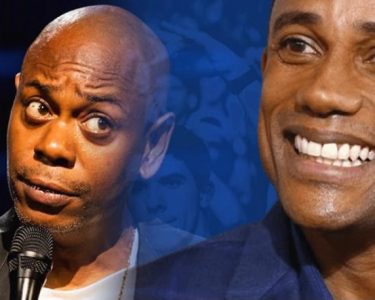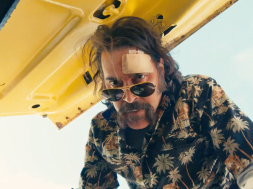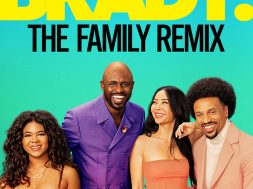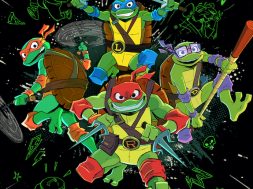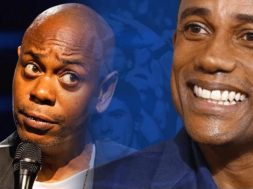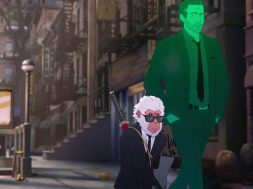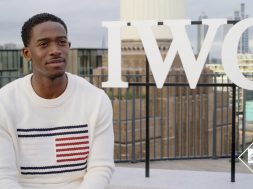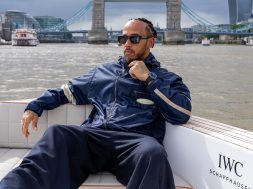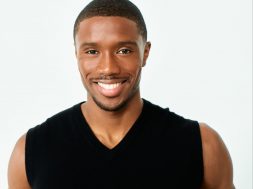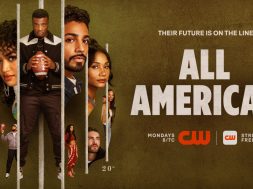INTERVIEW WITH DANIEL KARSLAKE DIRECTOR OF THEY KNOW NOT WHAT THEY DO
From the director/producer of FOR THE BIBLE TELLS ME SO comes a new film, FOR THEY KNOW NOT WHAT THEY DO, a powerful exploration of the intersection of religion, sexual orientation, and gender identity in America.
The film features four families of faith including Rob & Linda Robertson, who were encouraged by their evangelical church family to put their son, Ryan, in conversion therapy; David & Sally McBride, life-long Presbyterians who were shocked when their youngest boy came out to them as a transgender woman; Victor Baez & Annette Febo, whose Catholic tradition and Puerto Rican upbringing greatly concerned their gay son; and Harold & Coleen Porcher, a mixed-race couple whose child endured self-harm before their parents’ acceptance enabled them to come to terms with their gender. Alongside these family stories of faith, rejection, validation, tragedy, and triumph, the film weaves together unique perspectives from religious leaders. Through love, reconciliation, and acceptance, FOR THEY KNOW NOT WHAT THEY DO takes us on a journey of understanding what connects us all and gives us the courage to embrace each other.

DANIEL KARSLAKE FILMMAKER Q&A
1. Your previous film FOR THE BIBLE TELLS ME SO explored the experiences of religious parents finding out their child is LGBTQ and their journeys to find acceptance. What lead you to make FOR THEY KNOW NOT WHAT THEY DO as your follow-up and how did the Supreme Court legalization of marriage equality influence the focus of the film to examine religion’s influence on families with LGBTQ children?
Making my first film, FOR THE BIBLE, TELLS ME SO, was an incredible experience, and watching it ignite conversations among communities as the film played at festivals, was translated into 23 languages and had a successful 140-market theatrical run before premiering on streaming services, was really exciting. It has been a great ride, and for a very long time, I didn’t think I’d make another film about religion and LGBTQ people. But then America started to change…
When marriage equality became a reality in the U.S. in June of 2015, many celebrated it as a great victory of equality. But for many others on the conservative side of the aisle, it was the last straw…the death knell for a society that had lost its way. Immediately following the Supreme Court decision, we saw a large number of conservative clergy come out strongly against marriage equality vowing not to let the decision stand.
Then I started reading about laws that were being introduced in states across the U.S. that were designed to limit or completely take away the rights of LGBTQ people. Often called “religious freedom” bills, this new tactic from the right to invoke not just the Bible but the U.S. Constitution in their fight to deny equality to LGBTQ folks was alarming and incredibly widespread. In addition, so-called “bathroom bills” started popping up all over the country as well, so it was clear to me that the religious right was up to something big and that many in my own community weren’t even really noticing this new tsunami of hate.
Finally, sometime around August of 2015, I started getting threatening email messages and even a few death threats through the FOR THE BIBLE TELLS ME SO website. When that film first premiered in 2007, I received a number of very threatening messages through the website, but I hadn’t gotten one in many years. Then, all of a sudden, the threats started up again.
My husband and I live in Berlin, Germany, and we started to wonder “What’s going on in the U.S. right now that is empowering people to threaten me because of a film that’s almost 10 years old? And if they are threatening ME, then what’s happening to LGBTQ kids on school playgrounds and in the halls of high schools and colleges?!”
We knew that the presidential primaries had started, and we noticed that there was a Republican debate that week, so we tuned in. There were eight to ten Republican candidates for President in that debate, and what we found stunning was the fact that at least 80% of them proudly spouted incredibly anti-gay proclamations: “If I become President, gay marriage will end!” “Elect me and I will bring back Don’t Ask, Don’t Tell immediately!” “God says marriage is between one man and one woman…period!”That’s when I knew I needed to make a new film.
One thing that always bothered me about FOR THE BIBLE TELLS ME SO was that we weren’t able to address the issue of religious families with transgender kids in that film, so I decided early on that transgender families would be a focus of the new movie. I also knew that though we’d gotten pretty deep into the evangelical world with the last film, many of the most conservative evangelicals still think LGBTQ people are abominations, so I knew I wanted a deeply conservative family in the film as well. In addition, I wanted to explore this growing issue of “religious freedom” and what the framers of the Constitution really meant by the 1st amendment’s “freedom of religion” clause.
2. How did you find the families featured in the film?
When I’m making a film, everyone in my life knows it, so I hear from a lot of people all the time with suggestions of families to cast, issues to tackle, and experts to interview. A few years ago, my good friend, Matthew Vines, who is the author of a great book called GOD AND THE GAY CHRISTIAN and the founder of The Reformation Project, called to tell me about a couple he’d met recently who was deeply conservative, and who had lost a gay son to “reparative” or “conversion” therapy. Matthew had gotten to know them pretty well, and he wondered if they might tell their story in the film.
Once I read all I could online about Rob & Linda Robertson and watched a number of their YouTube videos, I knew I wanted to meet them…which I did a couple of months later with Matthew’s help at a Reformation Project Convention in Atlanta. The three of us had an immediate connection, and I knew almost immediately they had to be in the film.
Bishop Gene Robinson, one of my best friends, told me about Sarah McBride. He and I were talking about the movie and he mentioned an incredible trans woman, Sarah, with whom he’d worked at the Center for
American Progress. He had recently performed Sarah and Andy’s wedding and I found her story incredibly compelling. He arranged for a meeting, and again, I knew instantly that I wanted to tell her story.
One of the communities in which LGBTQ children really struggle is the Latinx community. Not only are most people from conservative Catholic backgrounds but the stereotype of the macho Latin male is grounded in some truth. This hadn’t been a community that was served specifically by FOR THE BIBLE TELLS ME SO, so I very much wanted to find the story of a Latinx family dealing with LGBTQ issues.
One of my fellow producers, Sheri Heitker, is based in Orlando where there is a large Latinx community, so she introduced me around to a number of people who might be able to find us a story for the movie. One of those great folks, Robin Maynard-Harris, introduced me to Vico Baez Febo, and after a number of extensive conversations with him and then his parents and his grandmother, we knew we’d found our Latinx story.
Finally, I very much wanted to find a family of color dealing with trans issues. It is well known that the murder rate of trans people, in particular trans women of color, has been skyrocketing, so it felt important to find a trans person of color for the movie. Through a number of good friends and colleagues, I met and got to know many trans folks of color, but each time, each of them were ultimately not comfortable committing to the film…which I found totally understandable given myriad issues not the least of which is that I am a man of pallor (white guy) so how could they be sure I would do their story justice?
Finally, an old friend of mine at Auburn Seminary in New York told me about Harold and Coleen Porcher. Coleen had done some work for Auburn so my friend knew her well, and he connected us. Initially, I spoke only with Coleen, then with Coleen & Elliot, and then finally with Harold, and ultimately they agreed to be part of the project!
3. How did you approach shooting the interviews considering they dealt with such personal and emotional topics?
With each of the families in the film, I made a point to spend a good amount of time with each of them; getting to know them and allowing them to get to know me before a camera was ever introduced to the relationship. We spoke for hours on the phone, went shopping and dining together, and a couple times, I would simply stay with them for a few days, so we could talk about anything and everything.
Once it started to feel like they really had a clear idea about why I was making the film and what I was hoping it would accomplish, then I would ask if they were comfortable with beginning to shoot…and things would proceed from there.
4. The film features interviews with a number of religious leaders and constitutional scholars including Bishop Gene Robinson, Pastor Delman Coates, Rev Dr. Jacqui Lewis, and Rev Cynthia Alice Anderson and also video footage of far-right conservative churches preaching anti-LGBTQ rhetoric and support for conversion therapy. How did you go about finding these experts and how readily available was the footage of Anti-LGBTQ sermons?
Because I’ve done so much television and film work dealing with religion, sexual orientation and gender identity, I already knew a number of the clergy/experts in the film. Bishop Gene Robinson told his family story in FOR THE BIBLE TELLS ME SO, and ever since, he and I have been very good friends. Reverend Dr. Mel White, is also in FOR THE BIBLE TELLS ME SO, and has a well-earned reputation as one of the smartest and most insightful members of the clergy who speak on these issues.
I had heard Reverend Dr. Delman Coates give a lecture at Chautauqua Institution a few years ago, so when I decided to make the film, he was one of my first calls.
I met Reverend Cynthia Alice Anderson at a huge screening of FOR THE BIBLE TELLS ME SO at her church, Christ Church Unity, in Orlando back in 2008, so when one of our stories, Vico’s story, originated from Orlando, I reached out to her to ask if she would be involved.
Finally, my last film, EVERY THREE SECONDS, actually premiered at Reverend Dr. Jacqui Lewis’ church, Middle Collegiate Church, in New York in 2014, and that’s when I met her. I was deeply impressed and since I knew a number of folks who attended the church, I began to go there on Sundays when I was in New York. She is one of the most compelling contemporary voices from the pulpit on any number of current issues; I was thrilled when she agreed to be part of FOR THEY KNOW NOT WHAT THEY DO.
Finding footage for the film of anti-LGBTQ sermons was not difficult at all. Sadly, as far as the LGBTQ community has come over the last few years, things have definitely gotten worse and more contentious since the new president was elected. Given his wide support by evangelicals, his politics of separation and hate have encouraged a resurgence of bigotry, homophobia, and transphobia from the pulpit that have had a clear and powerful effect in broader society.
5. What is your editing process and how do you work together with co-writer and editor Nancy C. Kennedy?
Many people outside of the documentary world do not realize how vital a good editor is. That’s the reason I was so thrilled when we were able to get Nancy Kennedy to cut FOR THEY KNOW NOT WHAT THEY DO. She is one of the most talented editors in the business, and we had worked together on FOR THE BIBLE TELLS ME SO, so we had a history.
Our biggest challenge was that I live in Germany, and she is based in Brooklyn.
We began our process by spending two weeks in Brooklyn last March sitting together and screening all the footage we had shot for the film… discussing in detail the story arcs of each of our four families. Then I returned to Germany, and Nancy started cutting, and sharing those cuts online. We spoke many times a week and then every 2.5 to 3 weeks, I returned to Brooklyn for another 10 days of working together. That continued until we were finished with the film in mid-January 2019.
It was absolutely a challenge for both of us, but in the end, the film came together, and I am in awe of the work that Nancy has done.
6. What was most challenging about making FOR THEY KNOW NOT WHAT THEY DO?
- Raising the money to make the film mostly from wealthy white gay men who often said “we have marriage equality…our fight is over…what still needs to be done?” was super hard.
- More challenging was the fact that because of the success of FOR THE BIBLE TELLS ME SO, absolutely no conservatives would grant me an interview for this film because that film has been a thorn in their side for a decade. As soon as they or their gatekeepers googled me, they declined the interview request…every time. Because of that, the only way to include the conservative viewpoint in the film was to use archival video of them saying what they say in their pulpits.
7. The film covers how there is still a large section of America that is unfamiliar with the transgender community and the confusion and fear that drives that. How do you think we can better educate and inform?
One of the best ways to break down barriers and to bring people together is to tell human stories. Nothing is more transformative than when you meet someone on screen with whom you identify, and then you watch them change. For many Americans, the transgender issue is particularly fear-filled and misunderstood because so few people actually know a trans person…or they at least THINK they don’t know a trans person.
We introduce all our characters in the film in the context of their families. First you meet the parents who seem like regular people…because they are. Then you learn that these people have an LGBTQ child and maybe you are as “against” that reality as the parents all were initially. But then you watch as these mothers and fathers start to educate themselves and evolve…and that evolves the viewer as well…at least a little bit. Indeed, being an eyewitness to the positive transformation of a family is a very powerful thing.
8. What do you hope audiences will take away from the film?
The power of conservative religion in America is surging. The 2016 election has breathed new life into the part of Christianity that doesn’t understand and doesn’t want any part of the LGBTQ community, and this can be deadly for young LGBTQ teens who find themselves in one of those families who think they can either embrace their religious beliefs or their child, not both…and they very often choose their religion over their son or daughter.
I hope this film offers an alternative to religious families caught in those crosshairs. It is not mutually exclusive to love your child for who God made them to be AND to stay true to your faith. The four families in the film prove that. And for those LGBTQ kids (or adults) whose religion makes them question their own worth and value, I want them to hear loud and clear that they are beloved and important exactly as God made them to be!
9. How can those interested in protecting LGBTQ rights in America help take action?
There are so many ways to work toward equality for everyone. If you’re an ally, then stand up and be heard. Make it clear in your family, in your community, in your workplace, and in your church, that you are fully supportive of all people, and that you are there for anyone who doesn’t feel that kind of support in their own home.
There are many great organizations doing important work for equality and they all need support. Sarah McBride, for example, works for the Human Rights Campaign, the largest LGBTQ rights organization in the world. They always need funds and volunteers! A quick Google search will reveal many more that need your help!
- www.ForTheyKnow.org
- www.FirstRunFeatures.com/ForTheyKnowNot.html
- Follow on Instagram @ForTheyKnowMovie and Facebook @FTKNWTD



